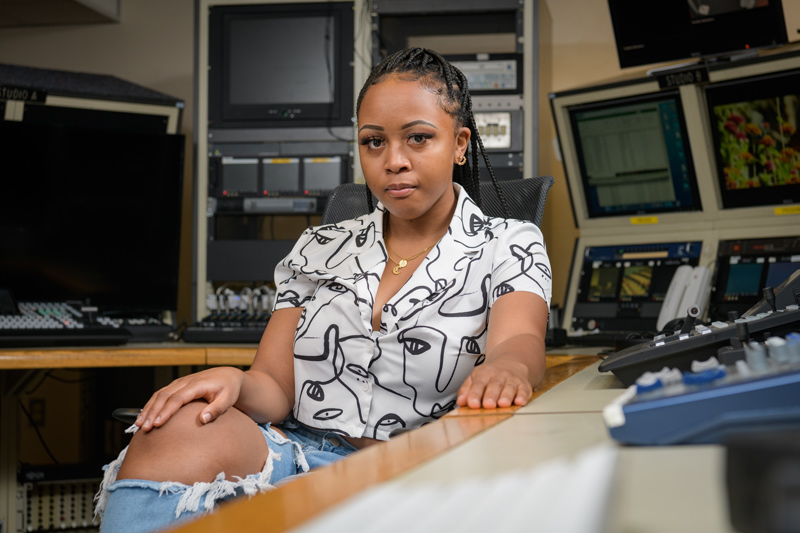


Portrayals of Black women
Photo by Evan Krape September 17, 2021
UD undergraduate student researches the characterization of Black women across major streaming services
Editor’s Note: This Q&A is one of a series of articles exploring the research University of Delaware students have been pursuing. Though COVID-19 continues to shape some plans, students still can participate in hundreds of remarkable projects, in-person and remotely. Follow our “Frontiers of Discovery” series as UDaily highlights some of these scholars.
Among quarantine’s greatest companions, subscriptions to streaming services soared during the COVID-19 pandemic, reaching a record 1.1 billion in 2020, according to the Motion Picture Association.
As these platforms have solidified their permanent place in our hearts and homes, they’ve also become the subject of study for researchers, including the University of Delaware senior Charise Lewis.

A Dover native, Lewis majors in communication with minors in advertising and women and gender studies. Outside of the classroom, she serves as the president of UD’s New Magazine and as an Oral Communication Consultant at the Writing Center.
Q. What are you studying this summer and with whom?
Lewis: I am studying the portrayal of Black women within the media, specifically analyzing content on streaming services. We are identifying the presence of stereotypes among Black women characters across 220 episodes of 70 different shows that have aired on Apple TV, Disney+, HBO Max, Hulu, Netflix, PBS and Prime Video within the last two years. I am studying with the help of my faculty mentor, Professor [Morgan] Ellithorpe, and friend, Sarah Jones, who is helping me code as well.
Q: What initially drew you to research?
Lewis: I actually went to the National Communication Association Conference during my sophomore year, where I saw communications research that had a focus on race and gender for the first time. That was what really gave me the push to pursue my own research, because I learned that I could investigate something that I felt passionate about and connected to.
Q. What motivated you to study this topic?
Lewis: My motivation came mostly from my identity. The discrimination and humilation of Black bodies were once forms of entertainment. For example, sexual violence against Black women was justified by their common portrayal as promiscuous "Jezebels.” As the civil rights movement and the fight to end discrimination progressed, media strayed away from these outright negative stereotypes. As a Black woman learning and understanding this history, I wanted to take a closer look at the present to see if there are still lingering effects.
Q: What have you found most surprising about this work so far?
Lewis: Time does play an important role in how these characters are portrayed. The ways in which Black women were depicted in older shows are noticeably different than how they are presented now. Many of the stereotypes that have recurred, like the "matriarch," are more subtle now than before. They are more hidden because newer stereotypes have also emerged, including the "strong Black woman." What is also surprising is the complexity of some of the characters that I have looked at. That, I think, is due in part to the media’s unconscious reinforcement of old patterns even as they try to move forward. But it’s also a reflection of the real pressures of Black women within society, constantly trying to navigate and dodge all of those stereotypes, one after the other. Those two things are interactional.
Q: What are the possible real-world applications for your study?
Lewis: I think that content creators and media outlets would benefit greatly from this research. By utilizing work like this before sharing their stories, they can avoid subconsciously reinforcing negative stereotypes, shed a more positive light on our community and ultimately create more black love.
Q: How would you explain your work to a fifth grader?
Lewis: I would say that my research involves looking at how new shows showcase people like me, what it means, how it affects the way we see ourselves and how other people see us in the real world.
Q: How does this experience align with your broader professional goals?
Lewis: My research shows where my passion is. I want to be able to work within the field of media communication, using information that I have obtained to work more effectively. I think that it is important to have people in the field that understand the implications of how we portray race and gender before doing it. I also would not mind teaching. I could definitely see the value of a women's studies or communication course about this subject.
Q: What advice would you give to your fellow students who may be considering or are planning to pursue undergraduate research?
Lewis: Do what feels natural to you. Pursue your interests and your passions — pick a topic that you will not get bored of. Once you get started, you are going to have deadlines, but don’t forget to go at your own pace. Breaks are necessary and taking a step back can give you a new perspective.
For Future Researchers
Blue Hens with big ideas will find ample opportunity to explore them with the help of the Undergraduate Research Program (URP).
A hallmark of any college experience, research is the process that leads to the creation of knowledge. It begins with a question and ends in a new understanding of the world around us.
Those who participate directly benefit from an enriched learning experience. They enjoy meaningful mentorship and develop critical leadership and communication skills. In addition, undergraduate researchers often earn higher GPAs and have greater success after graduation.
To explore more, visit the URP website and schedule a consultation with staff.
Questions? Contact undergradresearch@udel.edu.
Contact Us
Have a UDaily story idea?
Contact us at ocm@udel.edu
Members of the press
Contact us at 302-831-NEWS or visit the Media Relations website

